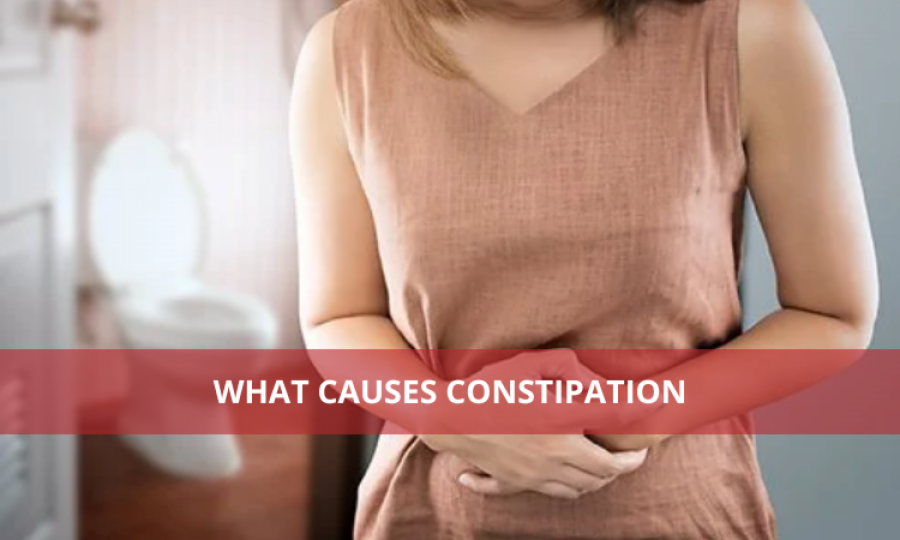What Causes Constipation

Constipation is a common condition that affects people from various age groups. People suffering from it are unable to pass stool regularly or they are unable to fully empty their bowels. It can also affect the size and texture of the stool, making it lumpy, hard, large, or small. Its severity varies in individuals; some may only experience it for a limited amount of time, while some may have it for a longer time, which interferes with their quality of life due to the pain and discomfort.
How does it happen?
Normally, nutrients are absorbed in the digestive system when food passes. The digested food has to pass from the colon (large intestine), where the water is absorbed. In constipation, food may move too slowly, which gives more time to the colon to absorb water. Constipation occurs as a result of the colon absorbing excessive water from waste products like stool, which makes the stool hard and difficult to pass out.
Causes
Lifestyle choices
● Low fiber diet
● Dehydration
● Inadequate exercise
● No proper routine, like sleeping or eating at different times
● Consuming a lot of cheese and milk
● Stress
● Delaying passing bowel movements
Medications
● Strong painkillers like narcotics that consist of codeine, oxycodone, and hydromorphone
● Non-steroidal anti-inflammatory drugs (NSAIDs) like ibuprofen and naproxen
● Antidepressants such as selective serotonin reuptake inhibitors ( SSRIs) and tricyclic antidepressants
● Antacids with calcium or aluminum
● Iron supplements
● Allergy medications, including antihistamines
● Some blood pressure drugs like calcium channel blockers (verapamil), diltiazem, nifedipine, and beta-blockers (atenolol)
● Psychiatric medicines including clozapine and olanzapine
● Anticonvulsants or anti-seizure drugs like phenytoin and gabapentin
● Anti-nausea medicines such as ondansetron
Medical conditions
● Endocrine conditions like diabetes, hypothyroidism, hypercalcemia, and uremia
● Irritable bowel syndrome
● Diverticular disease
● Colorectal cancer
● Outlet dysfunction constipation
● Lazy bowel syndrome
● Intestinal obstruction
● Neurological disorders, like multiple sclerosis, Parkinson's disease, spinal cord injury, and stroke
● Intestinal obstruction
● Multiple organ diseases, including amyloidosis, scleroderma, and lupus
● Structural defects in the digestive tract, like fistulas and volvulus
● Pregnancy
Treatment
Lifestyle modifications
● Drink more water and avoid caffeinated drinks and alcohol
● Consume more foods rich in fiber like fruits, vegetables, and whole grains
● Decrease consumption of fatty foods like meat, eggs, and cheese
● Add bran and cereal to your diet
● Maintain a food diary and keep track of what causes constipation
● Frequent exercise
● Changing how you sit on the toilet might help, like squatting may make passing stool easier
● Over-the-counter supplemental fiber
● Avoid using phones or other devices while passing stool
Reviewing medications
Your physician may review your medications and supplements to see if any of them may be causing constipation. They may prescribe an alternative or advise stopping the medications. You should never stop or change your medications before talking to your doctor.
Prescription medications
Drugs may be prescribed for the treatment of constipation such as lubiprostone, plecanatide, prucalopride, linaclotide, and lactulose.
Surgery
This is the last option and is rarely opted for. Your physician may suggest this if the constipation is a result of some structural defect in the colon.
Trending
Popular
Sindh pledges vigorous action to prevent poliovirus transmission
-
PMA stresses health equity on World ...
04:08 PM, 9 Apr, 2024 -
Dow University’s new rabies vaccine ...
12:18 PM, 28 Mar, 2024 -
IRD role lauded in advancing ...
02:53 PM, 12 Mar, 2024 -
Over one billion people worldwide ...
09:48 AM, 5 Mar, 2024




